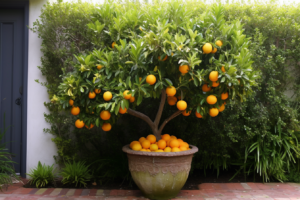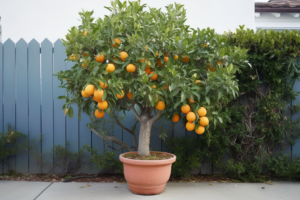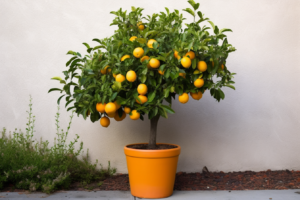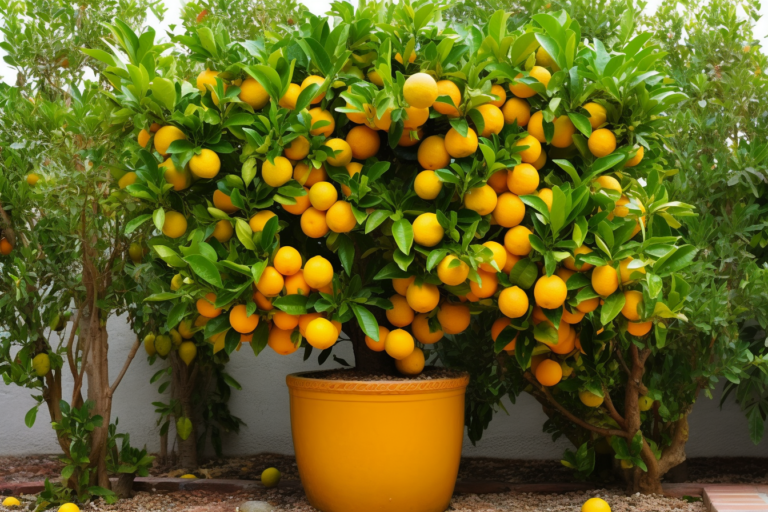Citrus trees are a popular choice for many gardeners in Southern California due to their beautiful appearance, fragrant blossoms, and delicious fruit. To keep these trees healthy and thriving, it’s crucial to understand how often and when to water them. In this article, we’ll explore the ins and outs of watering citrus trees in Southern California, ensuring your trees stay vibrant and fruitful all year long.
Importance of Proper Watering
Why Adequate Watering Matters
Water is essential for the growth and development of citrus trees. It helps in various processes such as nutrient absorption, photosynthesis, and temperature regulation. Without proper watering, trees can suffer from stress, leading to reduced fruit production, poor fruit quality, and susceptibility to pests and diseases.
The Role of Southern California Climate
The Mediterranean climate of Southern California, characterized by hot, dry summers and mild, wet winters, presents unique challenges for citrus tree care. It’s crucial to tailor your watering practices to suit these conditions and ensure optimal tree health.
Factors Influencing Watering Frequency
Tree Age and Size
- Young trees: Newly planted citrus trees need frequent watering to establish a healthy root system. Water them every 3-4 days during the first few weeks and gradually decrease the frequency as the tree establishes itself.
- Mature trees: Established trees have more extensive root systems and can withstand longer intervals between watering. Generally, water mature trees once a week during the growing season.
Soil Type
- Sandy soil: This type of soil drains water quickly, requiring more frequent watering. Aim for 2-3 times per week during hot, dry periods.
- Clay soil: Clay soil holds water longer, so you’ll need to water less often. Usually, once a week is sufficient.
Weather Conditions
- Hot, dry weather: During the scorching summer months, increase watering frequency to ensure your citrus trees receive adequate moisture.
- Rainy weather: Southern California winters are typically wetter, so you can reduce watering frequency or even skip it altogether if there’s enough rainfall.
How to Water Citrus Trees Effectively
Deep Watering Technique
To promote a healthy, deep root system, use the deep watering technique. This method involves slowly watering the tree, allowing the water to penetrate deep into the soil. Apply water to the root zone (the area beneath the tree’s canopy) and ensure the soil is moistened to a depth of at least 12-18 inches.

Mulching
Applying a 2-4 inch layer of organic mulch around the base of the tree helps retain soil moisture, regulate temperature, and prevent weed growth. Remember to keep the mulch a few inches away from the trunk to prevent rot.
Signs of Overwatering Citrus Trees
Overwatering is just as harmful as underwatering when it comes to citrus trees. A tree that gets too much water is prone to diseases, root rot, and reduced fruit production. Here are some signs that your citrus tree might be receiving too much water:
- Yellow leaves: If you notice that the leaves of your citrus tree are turning yellow, especially near the base of the tree, this could be a sign of overwatering. The excess water in the soil prevents the roots from getting the necessary oxygen, ultimately leading to the death of the tree.
- Leaf drop: Overwatered citrus trees often drop leaves prematurely, even during the growing season. This is because the saturated soil has a high salt content which can cause leaf burn.
- Slow growth: Since roots aren’t able to absorb enough oxygen from the waterlogged soil, it can stunt the growth of the tree. The leaves might also appear smaller than normal.
- Mold or mildew: Mushrooms, algae, and fungus thrive in damp environments, so if you notice any kind of mold or mildew growth on the trunk or leaves, it could be because the tree is getting too much water.
- Foul smell: Overwatering can cause a foul smell to emit from the soil. The odor is caused by the decomposition of organic matter that occurs in saturated soil.
If you see any of these signs, it’s important to cut back on watering immediately. To prevent overwatering in the future, make sure the soil has good drainage and only water the tree when the top inch of soil is dry to the touch. By following these tips, you’ll help ensure that your citrus tree stays healthy and productive for years to come.
Signs of Underwatering Citrus Trees
If you are not watering your citrus trees properly, you may start to notice signs of underwatering. Here are some things to look out for:
1. Wilting leaves
One of the most obvious signs of underwatering in citrus trees is wilting leaves. This occurs when there is not enough water in the soil for the roots to absorb. The leaves may droop or curl up at the edges, and may eventually fall off the tree if left untreated.
2. Dry soil
Another sign of underwatering is dry soil. Citrus trees need consistently moist soil to thrive, so if you notice that the soil is dry to the touch, it may be time to water.
3. Leaf tip burn
Leaf tip burn is a condition where the tips of the leaves turn brown or black. This can be caused by a variety of factors, including over-fertilization and underwatering. If you notice this symptom, it may be a sign that your citrus trees are not getting enough water.
4. Slow growth
Underwatered trees may also experience slow growth. If your citrus tree is not growing at a healthy rate, it may be a sign that it is not getting enough water.
5. Fruit drop
Fruit drop can occur for a variety of reasons, including underwatering. If your citrus tree is not getting enough water, it may drop its fruit prematurely as a survival mechanism.
Monitoring your citrus trees for these signs of underwatering is important for keeping them healthy and productive. In the next section, we will discuss how to properly water your citrus trees in Southern California.
Thanks for clarifying that. Here’s the section on “How Often to Water Young Citrus Trees” for the article on “How Often to Water Citrus Trees in Southern California?”:
How Often to Water Young Citrus Trees
Young citrus trees require special attention when it comes to watering. The first three years are critical to their growth and establishment, and the right balance of water is key to their success. Here are some guidelines to follow when watering young citrus trees:
- Frequency: Water your young citrus trees every 7 to 10 days during the growing season (March through October) and every 14 to 21 days during the dormant season (November through February).
- Amount: Give your young citrus trees a deep watering to a depth of about 18 inches each time. This will encourage deep root growth and help establish a strong root system.
- Mulch: Use a layer of organic mulch around the base of your young citrus trees to help retain soil moisture and regulate soil temperature. This can be especially important during hot summer months.
- Check moisture level: Check the moisture level of the soil around your young citrus trees regularly. A simple way to do this is to stick your finger into the soil up to the second knuckle. If the soil is dry, it’s time to water.
- Adjust for weather conditions: Adjust your watering schedule depending on weather conditions. For example, if you experience a heat wave or strong winds, your young citrus trees will need more frequent watering.
Young citrus trees are more susceptible to over-watering than under-watering. Too much water can lead to root rot and other problems. It’s essential to strike the right balance between providing enough water for growth and not drowning the roots. By following these guidelines, you can help your young citrus trees thrive and establish a strong root system that will support them for years to come.
How Often to Water Mature Citrus Trees
Mature citrus trees need to be watered less frequently than younger citrus trees. In general, mature citrus trees need to be watered only when the top layer of soil is dry to the touch. However, the exact frequency of watering depends on the specific tree species, soil type, weather conditions, and other factors. In general, it is better to underwater a mature citrus tree than to overwater it, as overwatering can lead to root rot and other diseases.
Here are some general guidelines for how often to water mature citrus trees:
- In general, mature citrus trees should be watered deeply and infrequently, about once every two to three weeks during the growing season (spring and summer), and once every four to six weeks during the dormant season (fall and winter).
- The exact frequency of watering depends on the specific tree species, soil type, weather conditions, and other factors. In general, it is better to underwater a mature citrus tree than to overwater it, as overwatering can lead to root rot and other diseases.
- To determine when to water your mature citrus tree, check the soil moisture regularly. Stick your finger about two inches into the soil and check if it feels dry. If the soil feels dry, it’s time to water the tree. If the soil feels moist, wait a few more days and check again.
- It is important to water your mature citrus tree deeply when you do water it. This means watering it slowly and evenly to allow the water to soak deeply into the soil. A good rule of thumb is to water the tree for about 30 minutes to an hour to ensure that the water reaches the entire root zone.
- In addition to watering, it’s also important to mulch around your mature citrus tree to help retain moisture in the soil. Apply a layer of organic mulch, such as wood chips or leaves, around the base of the tree, making sure to keep it away from the trunk.
- Finally, avoid watering your mature citrus tree when it’s hot and sunny, as this can cause the water to evaporate too quickly and be less effective. Instead, water your tree early in the morning or in the evening when the weather is cooler.
The Best Time of Day to Water Citrus Trees
As an expert gardener in Southern California, I am often asked about the best time of day to water citrus trees. After years of experience and research, I have found that the most optimal time to water citrus trees is in the early morning.
Here’s why:
- Early morning watering allows the roots to absorb the water before the daytime heat sets in. The sun can cause the water on leaves to evaporate quickly, and watering later in the day or in the evening can result in excess moisture on the leaves, promoting fungal growth.
- Watering early in the morning does not interfere with the tree’s photosynthesis process. Photosynthesis takes place during daylight hours, so watering at night may cause water to remain on the leaves and soil, hindering the plant’s ability to absorb CO2.
- Early morning watering allows for the soil to absorb the water before the sun heats up the soil, which can cause rapid evaporation and loss of moisture.
It is important to note that the frequency and amount of water needed for citrus trees varies depending on weather conditions, soil type, and other factors. Therefore, adjusting watering schedules based on these factors can maximize the benefits of morning watering.
To summarize, watering citrus trees in the early morning, before the heat of the day sets in, can not only prevent fungal growth but also allow the roots and soil to absorb the water more efficiently, resulting in a healthier and more vibrant tree.
The Best Time of Day to Water Citrus Trees
As an expert gardener in Southern California, I am often asked about the best time of day to water citrus trees. After years of experience and research, I have found that the most optimal time to water citrus trees is in the early morning.

Here’s why:
- Early morning watering allows the roots to absorb the water before the daytime heat sets in. The sun can cause the water on leaves to evaporate quickly, and watering later in the day or in the evening can result in excess moisture on the leaves, promoting fungal growth.
- Watering early in the morning does not interfere with the tree’s photosynthesis process. Photosynthesis takes place during daylight hours, so watering at night may cause water to remain on the leaves and soil, hindering the plant’s ability to absorb CO2.
- Early morning watering allows for the soil to absorb the water before the sun heats up the soil, which can cause rapid evaporation and loss of moisture.
It is important to note that the frequency and amount of water needed for citrus trees varies depending on weather conditions, soil type, and other factors. Therefore, adjusting watering schedules based on these factors can maximize the benefits of morning watering.
To summarize, watering citrus trees in the early morning, before the heat of the day sets in, can not only prevent fungal growth but also allow the roots and soil to absorb the water more efficiently, resulting in a healthier and more vibrant tree.
Tips for Properly Watering Citrus Trees in Southern California
Proper watering is crucial for the growth and health of citrus trees in Southern California. Here are some tips to help you water your trees properly:

- Water deeply and infrequently – Citrus trees thrive with deep watering, which helps the roots to grow deeply into the soil. Water the tree until the soil around it is moist to a depth of about 1-1.5 feet. Then, let the soil dry out before watering again. Overwatering can lead to root rot and other diseases.
- Water in the morning – It’s best to water your citrus trees early in the morning before the sun is high in the sky. This helps to reduce water loss through evaporation and ensures that the tree is well-hydrated during the hottest part of the day.
- Use a drip irrigation system – A drip irrigation system is an efficient way to water citrus trees. It reduces water waste through evaporation and ensures that water is delivered directly to the roots.
- Mulch – Mulching around the tree helps to conserve water by reducing soil evaporation. It also provides a protective layer of insulation against extreme temperatures.
- Consider the weather – If there has been a lot of rain or the weather is cool, you may not need to water your citrus tree as frequently. On the other hand, if it’s hot and dry, your tree may need more water.
- Monitor soil moisture – Use a moisture meter or simply stick your finger into the soil to check for moisture. If the soil is dry, it’s time to water.
- Adjust for soil type – Different soil types retain water differently. Sandy soil drains quickly and may require more frequent watering, while clay soil retains moisture for longer and may need less water.
These tips can help you properly water your citrus trees in Southern California, ensuring that they remain healthy and productive. Remember to water deeply and infrequently, choose the right time of day to water, use drip irrigation, mulch, consider the weather, monitor soil moisture and adjust for soil type.
Conclusion
Knowing how often to water citrus trees in Southern California is essential for their overall health and productivity. Factors such as tree age, soil type, and weather conditions should guide your watering schedule. Remember to use the deep watering technique and apply mulch to retain soil moisture. With proper care, your citrus trees will reward you with bountiful, delicious fruit.
FAQS
Can I use a drip irrigation system for my citrus trees?
Yes, drip irrigation is an excellent way to conserve water and deliver it directly to the root zone. Just make sure to adjust the watering frequency and duration to suit your tree's needs
How can I tell if my citrus tree needs more water?
Signs that your citrus tree needs more water include wilting leaves, leaf drop, and reduced fruit production. You can also check the soil moisture by digging a small hole near the tree's root zone. If the soil is dry at a depth of 4-6 inches, it's time to water your tree.
Should I water my citrus trees more frequently during a heatwave?
Yes, during a heatwave, it's essential to increase the watering frequency to ensure your citrus trees receive adequate moisture. Keep an eye on the soil moisture and the tree's overall health to determine the right amount of water.
Can overwatering harm my citrus trees?
Overwatering can indeed harm your citrus trees, as it can lead to root rot, fungal growth, and reduced fruit production. Make sure to adjust your watering schedule according to your tree's needs and the soil type to avoid overwatering.
Do different citrus tree varieties require different watering schedules?
While most citrus tree varieties have similar watering requirements, some may need slight adjustments depending on their specific needs. It's best to research the particular variety you're growing and tailor your watering schedule accordingly.


As a citrus tree owner in Southern California, this article was very informative and helpful. I always struggled with how much to water my trees, but now I know to water deeply every 7-10 days during the summer months. Thank you!